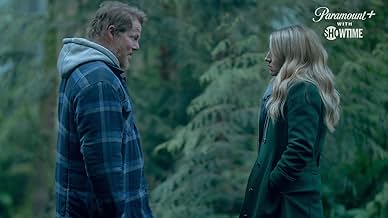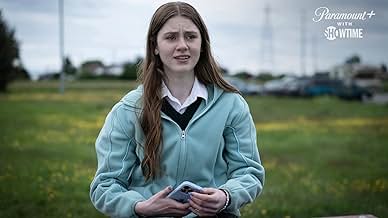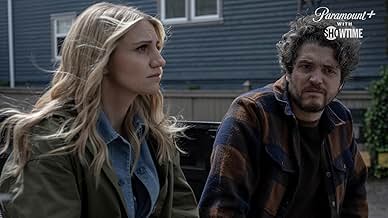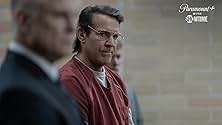La historia de Melissa Jesperson-Moore, que a los 15 años descubrió que su padre, Keith Hunter Jesperson, era el asesino en serie conocido como el Asesino de la Cara Feliz.La historia de Melissa Jesperson-Moore, que a los 15 años descubrió que su padre, Keith Hunter Jesperson, era el asesino en serie conocido como el Asesino de la Cara Feliz.La historia de Melissa Jesperson-Moore, que a los 15 años descubrió que su padre, Keith Hunter Jesperson, era el asesino en serie conocido como el Asesino de la Cara Feliz.
Explorar episodios
Opiniones destacadas
Great to see Dennis Quaid pull through with a creepy and hateable character.
The show is compelling and has got me well booked into where it's going to go
The hateable cast making dumb decisions details the otherwise interesting progression of the case, with the horrible performance by Annaleigh Ashford not doing any favours to my ability to watch more than 5 minutes without absolutely cringing.
Not 1 sentence, not 1 frame, not 1 expression is worthy of giving this woman the title of an "Actor". Absolutely drags the sub par performance of everyone else down with her...
Let's see where this goes...
The show is compelling and has got me well booked into where it's going to go
The hateable cast making dumb decisions details the otherwise interesting progression of the case, with the horrible performance by Annaleigh Ashford not doing any favours to my ability to watch more than 5 minutes without absolutely cringing.
Not 1 sentence, not 1 frame, not 1 expression is worthy of giving this woman the title of an "Actor". Absolutely drags the sub par performance of everyone else down with her...
Let's see where this goes...
The title pulled me in. The premise - a serial killer's daughter hiding her identity - had weight, tension, something dark and promising. And with Analeigh Ashford in the lead, I figured it had the bones to go somewhere. Episode 1 delivered. It leaned into the paranoia, the fear, the secrets.
Then the show took a wrong turn. The original premise faded, replaced by a routine detective drama padded with forgettable side characters and even more forgettable subplots. Melissa, once a compelling center, spirals into something shrill and exhausting. Her husband - a blank. Her daughter - unbearable.
But Dennis Quaid. He does something almost supernatural. As the serial killer - the actual murderer - he becomes the only one you want to watch. Charming, calm, and razor-sharp, he commands every scene with a twisted campy elegance. Somehow, he turns the monster into the magnet. You don't just understand him. You root for him.
It's a masterclass in subversion. The killer becomes the hero. Everyone else fades. And by the end, you realize the most dangerous man in the story is the only one worth following.
Then the show took a wrong turn. The original premise faded, replaced by a routine detective drama padded with forgettable side characters and even more forgettable subplots. Melissa, once a compelling center, spirals into something shrill and exhausting. Her husband - a blank. Her daughter - unbearable.
But Dennis Quaid. He does something almost supernatural. As the serial killer - the actual murderer - he becomes the only one you want to watch. Charming, calm, and razor-sharp, he commands every scene with a twisted campy elegance. Somehow, he turns the monster into the magnet. You don't just understand him. You root for him.
It's a masterclass in subversion. The killer becomes the hero. Everyone else fades. And by the end, you realize the most dangerous man in the story is the only one worth following.
It's not bad, but I think it tries to do a lot of things at once, and as result does not get particular good at any of them. There are multiple plotlines (which is fine, of course), and they do make sense considering the circumstances, but most of them feel quite shallow. And investigation bits are not that compelling.
On one hand, that's all understandable, since it's based on real life, and real life is not that "dramatic" most of the time, but this is a TV show, so some extra dramatization could be beneficial. As is it feels more like they had specific points in a plan, that needed to be checked off, and they did just that.
On the other hand, the show has moments when it tries to be almost like a "thriller", especially with some choices in music, and with some camera shots. As if there is some mystery, but there actually is no mystery at all. If the same tension was applied to the whole series, especially to parts related to relationships inside the family - it probably would have had more impact.
This is still a decent watch, though. Annaleigh was great, other actors were not far behind most of the times as well. "The Cranberries" in the soundtrack? And it is way more cohesive compared to "Good American Family", that started around the same time and is also based on true events.
On one hand, that's all understandable, since it's based on real life, and real life is not that "dramatic" most of the time, but this is a TV show, so some extra dramatization could be beneficial. As is it feels more like they had specific points in a plan, that needed to be checked off, and they did just that.
On the other hand, the show has moments when it tries to be almost like a "thriller", especially with some choices in music, and with some camera shots. As if there is some mystery, but there actually is no mystery at all. If the same tension was applied to the whole series, especially to parts related to relationships inside the family - it probably would have had more impact.
This is still a decent watch, though. Annaleigh was great, other actors were not far behind most of the times as well. "The Cranberries" in the soundtrack? And it is way more cohesive compared to "Good American Family", that started around the same time and is also based on true events.
I watched without knowing anything about the real crime. It seems people are just low balling this because it's not an accurate documentary. I watched for what it is intended to be, thriller entertainment and I felt each episode made me want to watch the next. They go through so many people that could be the killer but you don't know until the end and that made it extra enticing for me. I felt the acting was good and the end of each episode made me want to start the next which is what you want from a good show. If you simply watch for a thrilling entertainment based on a serial killer I don't think you'll be disappointed. If you're a crime hound wanting a true to life documentary this is not for you.
It was an interesting perspective from the vantage point of a serial killer's family member. There is a plethora of true crime serial killer shows out there but very little about being related to one of them and the impact that has. I don't feel that the storyline's intention was to depict the serial killer's story, it was about his actions and the impact that had on those closest to him. In that instance, the series delivered. Quaid does a wonderful job of bringing the narcissistic, manipulative mind of a killer to the viewer and keeps it suspenseful. The show did have a lot of peaks and valleys with regard to maintaining the viewer's interest. Annaleigh Ashford also does excellent work in her portrayal of Melissa. I feel that the story line doesn't dig deep enough into her character to allow it to fully develop. The remaining characters were rather pedestrian and underdeveloped as well. Maybe there will deeper insights into them in further seasons should there be any. One major observation I had that was not addressed in the show was Jesperson's stature. Keith Jesperson was a MASSIVE individual standing 6'8". I discovered this just prior to watching the series and couldn't help but feel how much more intense his character would have been portrayed had this been addressed. The show is good, it's worth watching. It left me wanting a bit more than I was given. Maybe that was the point.
¿Sabías que…?
- TriviaMelissa Jesperson-Moore served as a crime correspondent for the Dr. Oz show. She's also written a book about her experiences.
- ErroresVery early in the first episode, the Melissa character calls her dad in prison to tell him to leave her and her family alone. You cannot call into a prison and leave a message for an inmate, and they don't get voicemail. The most you could do is call the prison during regular hours and hope they get the message to call you back.
Selecciones populares
Inicia sesión para calificar y agrega a la lista de videos para obtener recomendaciones personalizadas
Detalles
- Tiempo de ejecución57 minutos
- Color
- Mezcla de sonido
- Relación de aspecto
- 2.39 : 1
Contribuir a esta página
Sugiere una edición o agrega el contenido que falta

Principales brechas de datos
What is the Canadian French language plot outline for Happy Face: Asesino en serie (2025)?
Responda






































